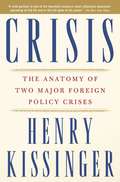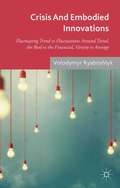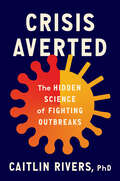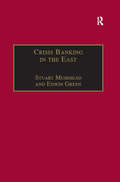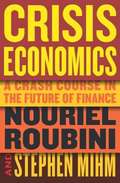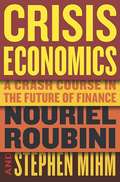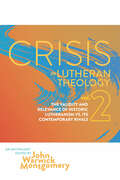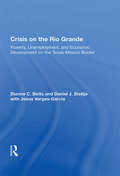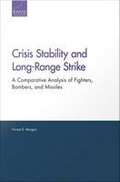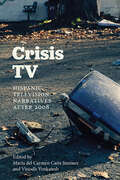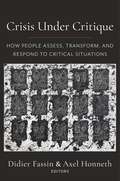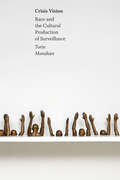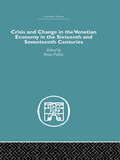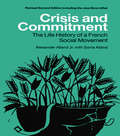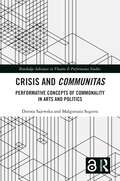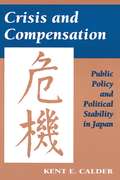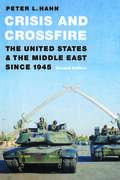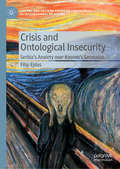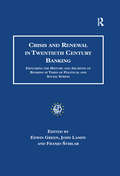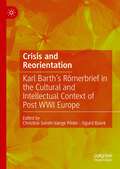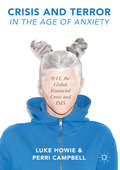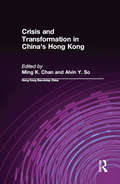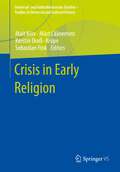- Table View
- List View
Crisis
by Henry KissingerBy drawing upon hitherto unpublished transcripts of his telephone conversations during the Yom Kippur War (1973) and the last days of the Vietnam War (1975), Henry Kissinger reveals what goes on behind the scenes at the highest levels in a diplomatic crisis. The two major foreign policy crises in this book, one successfully negotiated, one that ended tragically, were unique in that they moved so fast that much of the work on them had to be handled by telephone. The longer of the two sections deals in detail with the Yom Kippur War and is full of revelations, as well as great relevancy: In Kissinger's conversations with Golda Meir, Israeli Prime Minister; Simcha Dinitz, Israeli ambassador to the U.S.; Mohamed el-Zayyat, the Egyptian Foreign Minister; Anatoly Dobrynin, the Soviet Ambassador to the U.S.; Kurt Waldheim, the Secretary General of the U.N.; and a host of others, as well as with President Nixon, many of the main elements of the current problems in the Middle East can be seen. The section on the end of the Vietnam War is a tragic drama, as Kissinger tries to help his president and a divided nation through the final moments of a lost war. It is full of astonishing material, such as Kissinger's trying to secure the evacuation of a Marine company which, at the very last minute, is discovered to still be in Saigon as the city is about to fall, and his exchanges with Ambassador Martin in Saigon, who is reluctant to leave his embassy. This is a book that presents perhaps the best record of the inner workings of diplomacy at the superheated pace and tension of real crisis.
Crisis And Embodied Innovations
by Volodymyr RyaboshlykThis book introduces embodied innovations into the circle of already recognised causes of economic crises. The author shows how issues of investment, accumulation and structural change associated with embodied innovations can be used to monitor potential crisis. The author argues that crises are predictable and manageable in depth.
Crisis Averted: The Hidden Science of Fighting Outbreaks
by Caitlin Rivers PhD&“Readers should come away from Crisis Averted with a better comprehension of what public health does and why it is such a crucial endeavor.&” —The Washington Post"A master class in how we can pinpoint and prevent health crises before they spiral out of control."—Scott Gottlieb, MD, author of Uncontrolled SpreadA fascinating window into the secret life of epidemiology, weaving together stories of triumph and tragedy, with a boots-on-the-ground perspective on how we can avert the next public health crisisThere are few visible markers of the accomplishments of public health. When epidemiologists do their jobs, nothing happens. An outbreak does not grow into an epidemic. A child does not go hungry. A would-be smoker never lights up. In this fascinating window into the secret life of public health, Caitlin Rivers weaves together stories of triumph and tragedy to show that by making sure things don't happen, she and legions of scientists, practitioners, and policymakers change the course of history.We have many of the tools and experiences needed to prevent the next crisis, but as past experiences teach us, the unexpected is always around the corner. We cannot afford complacency, as countless challenges remain, including constantly emerging pathogens, the rapid growth of biotechnology, and the inconsistent cycles of funding for public health programs. Progress can be slow, but the unsung heroes in epidemiology remain focused on their missions. Crisis Averted tells their stories—from the eradication of smallpox in the twentieth century to a battle against mosquito-borne diseases in the Florida Keys to the international safeguards implemented against extraterrestrial germs. By taking a candid look at how we solve problems in public health, Caitlin Rivers illuminates the role of epidemiology in all our lives and lays out the case for what can be accomplished given sufficient vision, leadership, and resources. Crisis Averted is an inspiring and galvanizing call for us to work together towards a healthier, more resilient future.
Crisis Banking in the East: The History of the Chartered Mercantile Bank of London, India and China, 1853–93 (Studies in Banking and Financial History)
by Edwin Green Stuart MuirheadThe Chartered Mercantile Bank is one of the constituent banks of the huge Hongkong and Shanghai bank. This study charts its first 40 years as one of the pioneering banks of the Far East. The Chartered Mercantile became the leading exchange bank in India and South East Asia whilst always retaining its head office in the pivotal London market. Based upon meticulous research using a particularly rich set of banking archives, the book describes the complex political and financial circumstances on the subcontinent during the bank's early years and introduces the personalities in the Indian business and London banking worlds who guided the infant institution. The volatility of local markets is analysed, with portraits of the banks and merchant houses which did not survive the many financial crises in the East also included. This book will do much to remedy the lack of existing research into international finance, and Eastern banking in particular, in the 19th century. It provides an inside view of the workings of an Eastern bank - the nature of its business, methods of payment and exchange, recruitment and career patterns of staff, and includes valuable new material on the role of European bankers in an eastern setting.
Crisis Economics: A Crash Course in the Future of Finance
by stephen Roubini Nouriel MihmOne man saw it coming. As far back as 2005, Professor Nouriel Roubini – aka 'Dr Doom' – warned that the US housing bubble was set to crash, and what would begin as a national disease would soon spread overseas resulting in a deep recession. Free market fundamentalism would fail and we'd be faced with the worst economic crisis in history, crippling our global economy and bringing the world's financial systems to a shuddering halt. Sound familiar? By guiding us through a crash course in 'crisis economics' – black swans and white swans, pressure points in the global economy, crises that extend beyond national borders and bubbles in the financial sector that spill over into the real economy – Roubini shows us that boom to bust economics does not have to be destiny. Roubini offers a course for the future: radical reform of the international financial order and a clear view of regulation, supervision and greater coordination between central banks in Europe, Asia and the United States.
Crisis Economics: A Crash Course in the Future of Finance
by Stephen Mihm Nouriel RoubiniThis myth-shattering book reveals the methods Roubini used to foretell the current crisis before other economists saw it coming and shows how those methods can help to make sense of the present and prepare for the future.
Crisis In Lutheran Theology, Vol. 2: The Validity & Relevance of Historic Lutheranism vs. Its Contemporary Rivals (Crisis in Lutheran Theology)
by John Warwick MontgomeryAll Three volumes deal with the issue of biblical inerrancy (that the Bible is completely true and accurate, not only when it speaks to ideas of religious belief, but also when it speaks about factual elements of history and science, properly understood). This issue rocked the Lutheran Church Missouri Synod back in the late 1960s and early 1970s, prompting the release of the first two volumes. Volume one consists of essays by John Warwick Montgomery himself, and is addressed primarily to theologians. Volume two consists of an anthology by eight separate Lutheran contributors and is addressed to laymen as well as professional theologians. Volume 3 is new, never before published material and consists of essays by Dr. Montgomery outlining a new challenge along the same lines. Dr. Jeffery Kloha suggested a few years ago with the latest critical edition of the New Testament (Nestle-Aland 28th Edition), because of the interchangeability of some variant readings, that we now had a "plastic text". Dr. Montgomery goes up against this assertion with everything he has. Though obviously addressing themselves primarily to Lutheranism, the materials are, to a large degree, equally applicable to many of the other Christian communions and will be found to be extremely valuable in assessing the needs of a variety of denominations.
Crisis Management during the Roman Republic
by Gregory K. Golden'Crisis' is the defining word for our times and it likewise played a key role in defining the scope of government during the Roman Republic. This book is a comprehensive analysis of key incidents in the history of the Republic that can be characterized as crises, and the institutional response mechanisms that were employed by the governing apparatus to resolve them. Concentrating on military and other violent threats to the stability of the governing system, this book highlights both the strengths and weaknesses of the institutional framework that the Romans created. Looking at key historical moments, Gregory K. Golden considers how the Romans defined a crisis and what measures were taken to combat them, including declaring a state of emergency, suspending all non-war-related business, and instituting an emergency military draft, as well as resorting to rule by dictator in the early Republic.
Crisis On The Rio Grande: Poverty, Unemployment, And Economic Development On The Texas-mexico Border
by Dianne C. BettsWith the North American Free Trade Agreement (NAFTA) looming large and imminent, this book explores the socio-economic fabric of the U.S.-Mexico border region as a measure of NAFTA's future. It presents the social and economic history of the Lower Rio Grande Valley on the Texas-Mexico border. .
Crisis Stability and Long-Range Strike: A Comparative Analysis of Fighters, Bombers, and Missiles
by Forrest E. MorganTo effectively manage an international crisis, the United States must balance its threats with restraint. It must posture forces in ways that deter aggression without implying that an attack is imminent, while limiting its own vulnerability to surprise attack. A RAND study sought to identify which long-range strike assetsâ#128;#148;strike fighters, bombers, ballistic missiles, cruise missilesâ#128;#148;offer capabilities most conducive to stabilizing such crises.
Crisis TV: Hispanic Television Narratives after 2008 (SUNY series in Latin American and Iberian Thought and Culture)
by María del Carmen Caña Jiménez; Vinodh VenkateshCrisis TV addresses the motif of crisis that has come to dominate contemporary Hispanic televisual production since 2008 and the onset of the global financial crisis. In almost unprecedented fashion, the global economy came to a standstill, reshaping both geopolitical organizations and, more importantly, the lives of billions across the globe. The Great Recession, sociopolitical instabilities, the rise of extremist political parties and governments, and a worldwide pandemic have resulted in a mode of crisis that pervades contemporary television fiction. 2008 also marks a revolution in television, as local and global streaming services began to gain market share and even overtake traditional over-the-air transmission. The essays in Crisis TV identify and analyze the narrative tropes and aesthetic qualities of Hispanic television post-2008 to understand how different regions and genres have negotiated these intersecting crises and changing dynamics in production, dissemination, and consumption.
Crisis Under Critique: How People Assess, Transform, and Respond to Critical Situations (New Directions in Critical Theory #78)
by Fassin, Didier; Honneth, AxelThe word “crisis” denotes a break, a discontinuity, a rupture—a moment after which the normal order can continue no longer. Yet our political vocabulary today is suffused with the rhetoric of crisis, to the point that supposed abnormalities have been normalized. How can the notion of crisis be rethought in order to take stock of—and challenge—our understanding of the many predicaments in which we find ourselves?Instead of diagnosing emergencies, Didier Fassin, Axel Honneth, and an assembly of leading thinkers examine how people experience, interpret, and contribute to the making of and the response to critical situations. Contributors inquire into the social production of crisis, evaluating a wide range of cases on five continents through the lenses of philosophy, sociology, anthropology, political science, history, and economics. Considering social movements, intellectual engagements, affected communities, and reflexive perspectives, the book foregrounds the perspectives of those most closely involved, bringing out the immediacy of crisis. Featuring analysis from below as well as above, from the inside as well as the outside, Crisis Under Critique is a singular intervention that utterly recasts one of today’s most crucial—yet most ambiguous—concepts.
Crisis Vision: Race and the Cultural Production of Surveillance (Errantries)
by Torin MonahanIn Crisis Vision, Torin Monahan explores how artists confront the racializing dimensions of contemporary surveillance. He focuses on artists ranging from Kai Wiedenhöfer, Paolo Cirio, and Hank Willis Thomas to Claudia Rankine and Dread Scott, who engage with what he calls crisis vision—the regimes of racializing surveillance that position black and brown bodies as targets for police and state violence. Many artists, Monahan contends, remain invested in frameworks that privilege transparency, universality, and individual responsibility in ways that often occlude racial difference. Other artists, however, disrupt crisis vision by confronting white supremacy and destabilizing hierarchies through the performance of opacity. Whether fostering a recognition of a shared responsibility and complicity for the violence of crisis vision or critiquing how vulnerable groups are constructed and treated globally, these artists emphasize ethical relations between strangers and ask viewers to question their own place within unjust social orders.
Crisis and Change in the Venetian Economy in the Sixteenth and Seventeenth Centuries
by Brian PullanThe decline of Venice remains one of the classic episodes in the economic development of modern Europe. Its contrasts are familiar enough: the wealthiest commercial power in fifteenth-century Europe, the strongest western colonial power in the eastern Mediterranean, found its principal fame three centuries later in carnival and the arts. This metamorphosis from commercial hegemony to fashionable pleasure and landed wealth was, however, a complex process. It resulted not so much from the Portuguese voyages of discovery at the beginning of the sixteenth century as from increasing Dutch adn English competition at its end, and from industrial competition chiefly from beyond the Mediterranean. Several of the Articles Dr Pullan has chosen to illustrate these changes are made available in English for the first time, and two have been revised for this book. Four deal with the fortunes of entrepot trade and shipbuilding, which had furnished the basis of Venetian wealth adn influence in the Middle Ages; four others expamine the new fields of enterprise which Venice explored in the sixteenth and seventeenth centuries and which helped to compensate for the decline in traditional activities. This classic book was first published in 1968.
Crisis and Commitment: the Life History of a French Social Movement
by Sonia Alland Alexander Alland Jr.Using ethnographic field data from the Larzac plateau in Southern France, Alexander and Sonia Alland document one of the longest and most successful popular protests in modern French history - the Larzac movement. More than a record of events, the book describes the transformation from the early 1970s of rural defiance into a symbol of left-wing action for France and the world. This revised edition examines the activities of the movement since 1995, including the demonstrations at the Seattle meeting of the World Trade Organisation, the 'great hamburger war' against McDonalds, and the broadening of the movement to embrace struggles elsewhere, such as the anti-nuclear protests in French Polynesia. Particular attention is paid to the charismatic Jose Bove, who has become the figurehead and focus of the campaign during this period.This account will be of particular interest to anthropologists and historians of contemporary France and Europe as well as students of protest and social movements, and of contemporary politics in general
Crisis and Communitas: Performative Concepts of Commonality in Arts and Politics (Routledge Advances in Theatre & Performance Studies)
by Małgorzata Sugiera Dorota SajewskaThis book is a critical, transdisciplinary examination of a broad range of philosophical ideas, theoretical concepts, and artistic projects of community in the 20th and 21st century in the context of global/local social and political changes. This volume opens new vitas by focusing on carefully selected instances of multipronged crises in which existing concepts of commonality are questioned, reformulated, or even speculatively designed with a (better) future in view. As many authors of this volume argue, in the face of today’s unprecedented global ecological and economic challenges speculative design is of utmost importance as it can foster alternative, unthought-of forms of connectivity that go far beyond progressivist narratives of nation, corporation, and nuclear family. Focusing on the situations of upheaval, both historical and fabulated, the collection not only examines how multipronged crises trigger antagonisms between egalitarian forms of communitas and the normative concept of the nation (and other normative forms of communities) as a community that separates and excludes. It also looks closely at philosophical and artistic projects that strive to go beyond the dichotomies and typically extrapolated utopias, envisaging new political economies, ways of living and alternative relational structures. It will be of great interest to students and scholars in performance studies, cultural studies, political studies, media studies, postcolonial and decolonial studies, critical anthropology.
Crisis and Compensation: Public Policy and Political Stability in Japan
by Kent E. CalderWhy does Japan, with its efficiency-oriented technocracy, periodically adopt welfare-oriented, economically inefficient domestic policies? In answering this question Kent Calder shows that Japanese policymakers respond to threats to the ruling party's preeminence by extending income compensation, entitlements, and subsidies, with market-oriented retrenchment coming as crisis subsides. "Quite simply the most ambitious and strongly argued interpretation of a key dimension of Japanese political life to appear in English this decade."--David Williams, Japan Times "Historically dense and conceptually rich.... [Forces] readers' attention to the domestic underpinnings of Japanese foreign policy."--Donald S. Zagoria, Foreign Affairs "Punctures the myth of Japan Inc. as a cool, rational monolith...."--Kathleen Newland, Millennium "A bold reinterpretation of Japanese politics that will force us to rethink many of our current assumptions and will influence our research agenda."--Steven R. Reed, Journal of Japanese Studies
Crisis and Crossfire: The United States and the Middle East Since 1945
by Peter L. HahnCrisis and Crossfire traces the origins of the contemporary challenges facing the United States in the Middle East by analyzing the broad contours of U.S. policy in the region since the government&’s first involvement there in the 1940s. Peter L. Hahn evaluates U.S. policy in the context of such global phenomena as the Cold War and the multipolar international order that emerged in the early 2000s. He explains how the United States has tried, with varying degrees of success, to curtail, modify, and channel Arab and Iranian nationalist movements to serve U.S. interests.Crisis and Crossfire examines the U.S. approach to the Arab-Israeli conflict through eight decades, exploring the interstate wars of the 1940s–1980s, the quests to make peace in the 1970s–2010s, and the enduring strife between Israel and Palestine. Hahn details how the United States has assumed growing responsibility for regional stability and security in the Middle East since World War II, culminating in involvement in the Gulf War to liberate Kuwait and the invasions and occupations of Afghanistan and Iraq. This second edition provides an objective explanation of the Israeli-Palestinian Gaza War; the U.S. stand-off with Iran; the proxy wars in Lebanon, Yemen, Libya, and Syria; the threat of terrorism; and related topics.
Crisis and Leviathan: Critical Episodes in the Growth of American Government
by Robert HiggsThis book offers a multi-causal explanation, guided by a novel analytical framework firmly grounded in historical evidence. It is a thorough analysis of the actual occasions when and the specific means by which Big Government developed in the United States.
Crisis and Ontological Insecurity: Serbia’s Anxiety over Kosovo's Secession (Central and Eastern European Perspectives on International Relations)
by Filip EjdusThis book develops a novel way of thinking about crises in world politics. By building on ontological security theory, this work conceptualises critical situations as radical disjunctions that challenge the ability of collective agents to ‘go on’. These ontological crises bring into the realm of discursive consciousness four fundamental questions related to existence, finitude, relations and autobiography. In times of crisis, collective agents such as states are particularly attached to their ontic spaces, or spatial extensions of the self that cause collective identities to appear more firm and continuous. These theoretical arguments are illustrated in a case study looking at Serbia’s anxiety over the secession of Kosovo. The author argues that Serbia’s seemingly irrational and self-harming policy vis-à-vis Kosovo can be understood as a form of ontological self-help. It is a rational pursuit of biographical continuity and a healthy sense of self in the face of an ontological crisis triggered by the secession of a province that has been constructed as the ontic space of the Serbian nation since the late 19th century.
Crisis and Renewal in Twentieth Century Banking: Exploring the History and Archives of Banking at Times of Political and Social Stress (Studies in Banking and Financial History)
by John Lampe Edwin GreenCrisis and Renewal in Twentieth Century Banking explores the behaviour of banks at times of war, revolution, civil war, social turmoil, and reconstruction. Analysing the history and archives of banks, it discovers examples of how banking is affected by political and social upheavals; how banks may influence the outcome of such events; how banking has recovered from periods of intense political and social stress; and how the archives of banks provide remarkable testimony to events in the wider world. By examining the setting of different banking markets in the last century, up to and including the transformation of Eastern and South Eastern Europe in the 1990s, this book marks a new direction for international discussion and research. Contributors include senior historians and archivists from Europe and the United States. Contributions include papers on Russia and foreign banks, 1917-30; depression and crisis in Central Europe in the 1930s; Civil War in Spain; post-war reconstruction in banking in Germany and the Far East; and crisis and renewal in South East Europe. The papers published in this collection were first presented at the twelfth Annual Conference of the European Association for Banking History, held in Ljubljana, Slovenia, in May 2001, and hosted by the Bank of Slovenia and the Nova Ljubljanska Banka.
Crisis and Reorientation: Karl Barth’s Römerbrief in the Cultural and Intellectual Context of Post WWI Europe
by Sigurd Baark Christine Svinth-Værge PõderThis book uses Karl Barth’s Der Römerbrief (1922) as a prism through which to explore the role of religion and its interactions with cultural and political thought in the turbulent interwar period in Europe. One of the most influential books in twentieth-century protestant theology, Der Römerbrief found Barth arguing that the crisis of the time was grounded in an even more profound crisis that pertained to the human condition as such. While much research has been conducted on Der Römerbrief, most of it has focused on the book’s explicit theology. The aim of the present volume is to mark the centenary of this seminal book with a broader investigation into the movements of thought within Der Römerbrief and its reception and impact within its cultural and intellectual context. This broader approach by a range of Northern European researchers brings attention to interconnections between cultural and theological movements in times of crisis.
Crisis and Terror in the Age of Anxiety: 9/11, the Global Financial Crisis and ISIS
by Luke Howie Perri CampbellThis book confronts the issues young people face growing up in the confusion and anxiety of today's highly global society. Young people face their futures consumed with feelings of doubt, uncertainty and ambivalence. The Global Financial Crisis and the rise of the Islamic State means young people are transitioning into adulthood in a time that we call an age of anxiety. They may be the first generation to have fewer opportunities than their parents yet, despite this, they are learning to imagine other kinds of futures. These are futures where economic collapse provides opportunities for entrepreneurialism and innovation, where Islamic State does not need to pose a clear and present danger, and where political action provides hope for a better world. Dealing with the current political and economic climate and progressive campaigns such as Black Lives Matter, Howie and Campbell tackle some of the biggest threats to the future of society. An innovative and wide-reaching study, this book will be of particular interest to scholars of human geography, disaster studies, politics, and sociology.
Crisis and Transformation in China's Hong Kong (Hong Kong Becoming China: Beyond 1997 Ser.)
by Ming K. Chan Alvin Y. SoHong Kong has undergone sweeping transformation since its return to Chinese sovereignty in 1997. This is a multidisciplinary assessment of the new regime and key issues, challenges, crises and opportunities confronting the Hong Kong Special Administrative Region (HKSAR).
Crisis in Early Religion (Universal- und kulturhistorische Studien. Studies in Universal and Cultural History)
by Sebastian Fink Mait Kõiv Märt Läänemets Kerstin Droß-KrüpeReligion is closely linked to social development as it often serves as the ideological fundament of a society and one of the foremost expressions of its culture. The articles in this volume are devoted to the study of religious crisis in Anqituity and deal with these pheonomena in the Ancient Near East, Rome, Greece, China and India.
